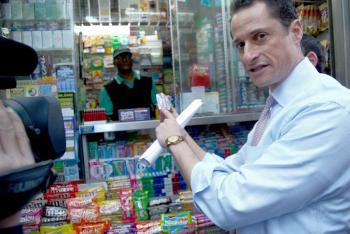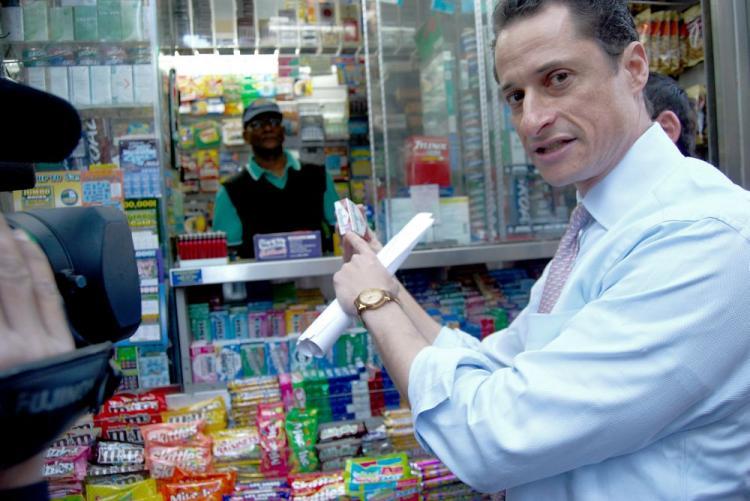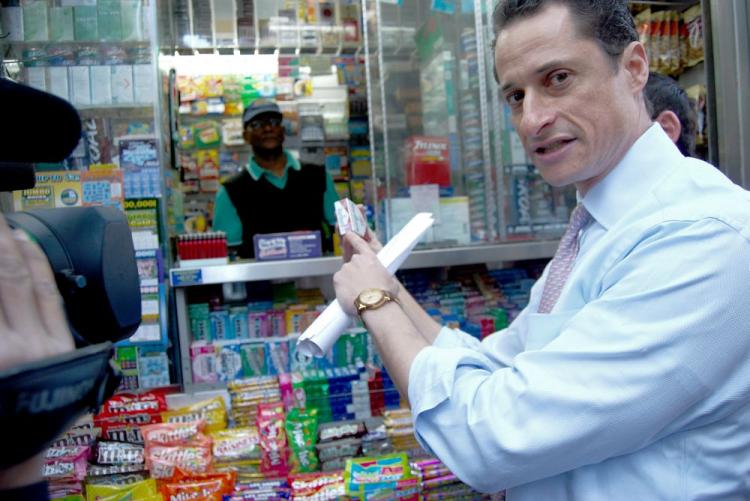NEW YORK—Representative Anthony Weiner and State Senator Jeff Klein released a report Sunday, April 5, showing that New York City is losing up to $150 million a year in tax revenue due to online cigarette sales.
On April 1, taxes for cigarettes were raised, and are now about $4.50 per pack, bringing the price up to about $10 for a pack of cigarettes.
“Those are policies that I support,” Weiner said. “They are intended to be a way to do a couple of things: one is to dissuade people from smoking, and two, to offset the high cost of taking care of the people who make the mistake of smoking—something that is not only deadly to themselves, but has enormous costs to our hospitals, our health care systems, and our society.”
Weiner said that the rise of taxes is causing an increase in incentives to avoid the taxes as well.
“We’re seeing more and more people going to the Internet, and using the technology provided by the Internet combined with the anonymity provided by the Internet to essentially, avoid the taxes,” he said, presenting a poster of a screenshot of one of the cigarette sales websites with the highlighted lines: “We have never and do not report any information about our customers to any authorities” and “Our current methods of shipments include USPS for both American and European brands. We continue to ship to all states within the USA.”
Weiner announced that the legislation they were trying to pass would ban the United States Postal Service from shipping cigarettes. FedEx, UPS, and DHL have already agreed not to mail tobacco, but Weiner says that the USPS has said they’d prefer to see this as a federal law before complying.
There is already a law against not paying taxes for cigarettes, whether they’re bought on a reservation or online, and raising the crime from a misdemeanor to a felony will help stop the sale of untaxed cigarettes as well.
Weiner says that, for the city of New York alone, revenue loss is up to $150 million a year from the State excise tax, City excise tax, and 8.375 percent sales tax combined.
Senator Klein said that he’s found, over the years, that young people are able to purchase cigarettes over the Internet as long as they verify, by checking a box, that they are over 18 years of age.
“The way we use our cigarette taxes, in the state of New York, is to provide health benefits,” he said. “We are actually able to insure $1.5 billion New Yorkers through an insurance program for the poor through cigarette taxes.”
Weiner reported that the reason the losses were so high for New Yorkers is because nine out of the top 10 cigarette sales Web sites are run in New York.
“Every one of those transactions that takes place from a New York State Web site theoretically is loss revenue for New York,” he said.
“We’re really making victims out of two groups of people who don’t deserve it,” he said. “One is the people who pay the taxes legitimately. They deserve, if they’re going to pay the tax, that the smoker sitting next to them in the park also pays the tax. And second, the law-abiding merchants—like the one behind us. They are at a competitive disadvantage as we are levying a tax only they have to pay.”
On April 1, taxes for cigarettes were raised, and are now about $4.50 per pack, bringing the price up to about $10 for a pack of cigarettes.
“Those are policies that I support,” Weiner said. “They are intended to be a way to do a couple of things: one is to dissuade people from smoking, and two, to offset the high cost of taking care of the people who make the mistake of smoking—something that is not only deadly to themselves, but has enormous costs to our hospitals, our health care systems, and our society.”
Weiner said that the rise of taxes is causing an increase in incentives to avoid the taxes as well.
“We’re seeing more and more people going to the Internet, and using the technology provided by the Internet combined with the anonymity provided by the Internet to essentially, avoid the taxes,” he said, presenting a poster of a screenshot of one of the cigarette sales websites with the highlighted lines: “We have never and do not report any information about our customers to any authorities” and “Our current methods of shipments include USPS for both American and European brands. We continue to ship to all states within the USA.”
Weiner announced that the legislation they were trying to pass would ban the United States Postal Service from shipping cigarettes. FedEx, UPS, and DHL have already agreed not to mail tobacco, but Weiner says that the USPS has said they’d prefer to see this as a federal law before complying.
There is already a law against not paying taxes for cigarettes, whether they’re bought on a reservation or online, and raising the crime from a misdemeanor to a felony will help stop the sale of untaxed cigarettes as well.
Weiner says that, for the city of New York alone, revenue loss is up to $150 million a year from the State excise tax, City excise tax, and 8.375 percent sales tax combined.
Senator Klein said that he’s found, over the years, that young people are able to purchase cigarettes over the Internet as long as they verify, by checking a box, that they are over 18 years of age.
“The way we use our cigarette taxes, in the state of New York, is to provide health benefits,” he said. “We are actually able to insure $1.5 billion New Yorkers through an insurance program for the poor through cigarette taxes.”
Weiner reported that the reason the losses were so high for New Yorkers is because nine out of the top 10 cigarette sales Web sites are run in New York.
“Every one of those transactions that takes place from a New York State Web site theoretically is loss revenue for New York,” he said.
“We’re really making victims out of two groups of people who don’t deserve it,” he said. “One is the people who pay the taxes legitimately. They deserve, if they’re going to pay the tax, that the smoker sitting next to them in the park also pays the tax. And second, the law-abiding merchants—like the one behind us. They are at a competitive disadvantage as we are levying a tax only they have to pay.”







